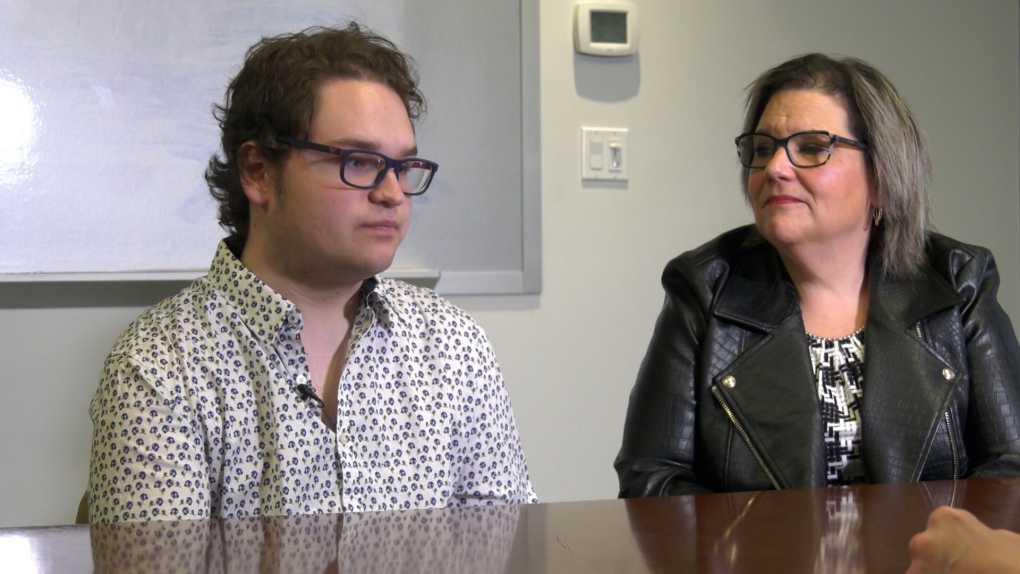IQ test not a fair signal of ability for disability support in Alberta program, says family of man with autism

Evan Zenari says he didn’t think it would be such a difficult process to qualify for the Alberta government’s Persons with Developmental Disabilities (PDD) program.
The 21-year-old is at the centre of a report by the province’s ombudsman investigating the eligibility requirements to get into the PDD program.
“It would be nice if I could get somewhere in life,” says Zenari.
Zenari was born with developmental disabilities and is on the autism spectrum. Some of his skills are limited, and he can’t find a job.
He received support through a program for families of children with disabilities until he turned 18, when he applied for PDD support. He was rejected based on the findings of an IQ test: his score was nine points higher than the eligibility cutoff. There is no IQ test for the children’s program.
“On one hand, I have guardianship of him, and on the other hand they think he doesn’t require support,” said Janice Zenari, Evan’s mom. “If he had the proper toolbox, the proper supports to make things happen, his life could flourish just as well as anybody else’s independent life.”
An appeal board sided with Evan and Janice, but had to factor in the intelligence tests according to regulations and could not reverse the government’s decision.
“IQ, maybe that should be considered as a factor,” says Janice. “Right now, it’s the key factor. But the adaptability skills, and the person as a whole… (the government should) individually look at the person and see if they really are capable.”
Janice brought Evan’s case to the ombudsman, who launched an investigation into the program. A report, released last week, found the legislation is “flawed.” The ombudsman says that the application requirements are discriminatory to those whose IQ score doesn’t represent their intellectual capacity, siding with previous court challenges of the requirements.
In a statement to CTV News Edmonton, ombudsman Kevin Brezinski said, “Without action being taken to amend the regulation, the potential remains for others to experience similar barriers to accessing PDD services.”
The provincial government disagrees with his findings.
“The reality is that the young man in question is being cared for,” said Seniors, Community and Social Services Minister Jason Nixon during a press conference, when asked about Evan’s case on May 8. “That is with AISH (Assured Income for the Severely Handicapped), where there are several thousand dollars a month being provided to this individual. Our government has multiple ways that we work with the disabled in the province. My department spends $3.5 billion on those programs.”
Nixon added, “To change that policy for one individual would present significant challenges to the PDD program going forward. The government’s position is that we are comfortable with our current process for PDD. We will be maintaining it, not changing it. We will also be making sure that other programs that we have in cases like this where an individual does not meet the requirements for PDD, that we have other programs to help care for them going forward.”
An advocate says the PDD program would allow Evan to spend time with trained professionals who could teach him to overcome challenges and be more comfortable doing everyday things himself.
“One program doesn’t have anything to do with the other,” Keri McEachern, an advocate with Disability Support Services of Alberta, said of the difference between AISH and PDD. “One is about having money, the other is about having staff. We’re not necessarily saying that PDD is the answer for Evan or other people in his situation, but there has to be something. There has to be some sort of strategy that assists people in some way.”
In the meantime, Evan is volunteering at his mom’s office. “I try to look for postings,” he says. “But I’m not getting anywhere, unfortunately. If I had support, maybe I’d have a better experience in life.”
“Any other parent you talk to, our biggest concern in life is what’s going to happen to our children when we are gone,” Janice said. “Who’s going to support him? What’s their life going to look like?”
View original article here Source









